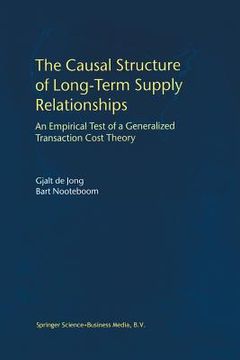Share
The Causal Structure of Long-Term Supply Relationships: An Empirical Test of a Generalized Transaction Cost Theory (in English)
Bart Nooteboom
(Author)
·
Gjalt De Jong
(Author)
·
Springer
· Paperback
The Causal Structure of Long-Term Supply Relationships: An Empirical Test of a Generalized Transaction Cost Theory (in English) - De Jong, Gjalt ; Nooteboom, Bart
$ 161.04
$ 169.99
You save: $ 8.95
Choose the list to add your product or create one New List
✓ Product added successfully to the Wishlist.
Go to My WishlistsIt will be shipped from our warehouse between
Monday, July 08 and
Tuesday, July 09.
You will receive it anywhere in United States between 1 and 3 business days after shipment.
Synopsis "The Causal Structure of Long-Term Supply Relationships: An Empirical Test of a Generalized Transaction Cost Theory (in English)"
Long-term supply relationships are of crucial importance in industrial organization. The present (r)evolution in information and communication technology such as e-business is proof of the increasingly dynamic environment in which firms operate. As a result, firms have to focus on their core competencies and obtain complementary ones from partner firms to be able to survive. This can hardly be realized without having long-term supply relationships. In the past decades, research on strategic alliances -the class of interfirm arrangements to which long-term supply relationships belong- mushroomed. Many ofthe (empirical) studies in the alliance literature focus on a single variable that is then explained by a set of independent variables. For example, for international joint ventures the level of commitment, interdependence, asymmetry, and dedicated investments explains the development of trust. By itself there is nothing wrong in this approach. On the contrary, because of all these studies we now have some knowledge about the reasons why firms enter in alliances and why some alliances are more successful than others. In fact, one of our first studies also belonged to this research-tradition.
- 0% (0)
- 0% (0)
- 0% (0)
- 0% (0)
- 0% (0)
All books in our catalog are Original.
The book is written in English.
The binding of this edition is Paperback.
✓ Producto agregado correctamente al carro, Ir a Pagar.

